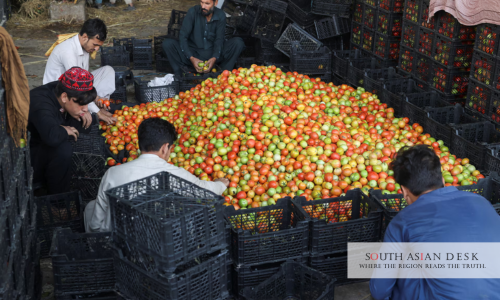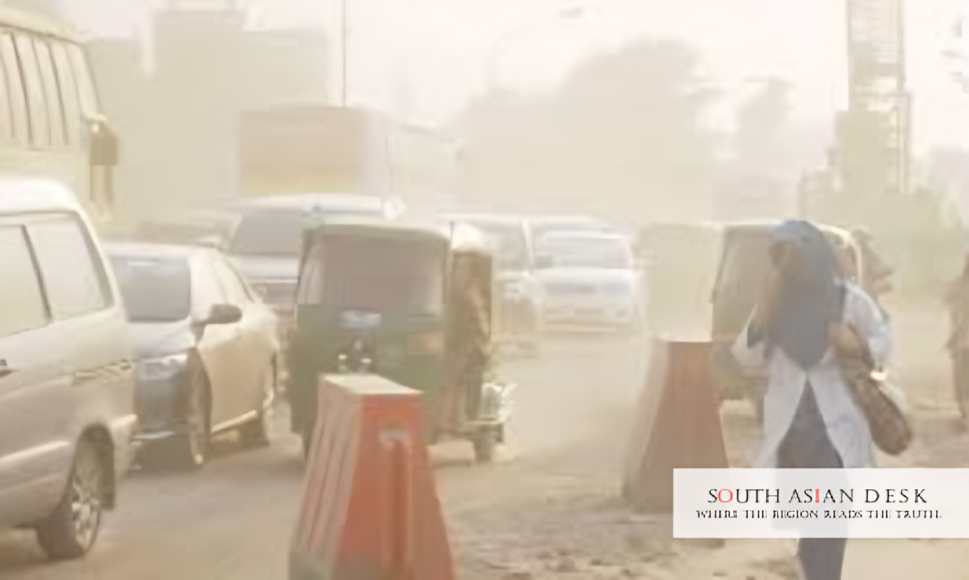Peshawar, October 24, 2025: The price surge of food essentials at the Pakistan-Afghanistan border intensified this week, as the closures of Torkham and Chaman since October 11 halted Afghan imports, inflating tomato costs by over 400% to Rs600 per kg and stranding 5,000 containers of perishables.
Clashes erupted on October 10 with Pakistani airstrikes on alleged militant sites in Kabul and Paktika provinces. The Taliban responded with attacks on border posts. Dozens died in the worst fighting since 2021. A ceasefire mediated by Qatar and Turkey has been in place since October 19. Borders bar trade despite the truce. Negotiations are set to resume in Istanbul on October 25.
The surge in food essentials prices along the Pakistan-Afghanistan border reveals supply chain perils across South Asia. Pakistan imports 70% of off-season vegetables from Afghanistan, feeding millions in Punjab and Khyber Pakhtunkhwa. Disruptions cascade to India via shared trucking routes and Bangladesh through regional markets. Militant crossovers fuel instability, endangering $2.3 billion bilateral trade that bolsters food security for 240 million people.
Torkham Border Closure: Vegetable Prices Spike
Forces sealed Torkham on October 11 after ground skirmishes. Chaman shut soon after. Pakistani jets targeted havens in Khost and Paktika. The Taliban decried sovereignty breaches.
Perishables rot en masse. Vegetables, fruits, wheat, and dairy products form 60% of the flows. Daily, 500 containers spoil without clearance.
Khan Jan Alokozay, head of the Pak-Afghan Chamber of Commerce in Kabul, quantified the drain. “With each passing day, both sides are losing around $1 million,” Alokozay said. He noted that 500 vegetable containers were wasted daily.
Peshawar stalls empty fast. Tomatoes leaped from Rs 120 to Rs 600 per kg. Capsicum touched Rs300 per kg. Garlic hit Rs400 per kg. Apples have doubled in price to Rs250 per kg in Lahore.
Vendors halve portions. A trader reported a 50% drop in sales.
Pakistan’s Ministry of Foreign Affairs stated on October 12. “Pakistan is deeply concerned at the unwarranted aggression by the Afghan Taliban… along the Pak-Afghan border,” it read. Officials demanded that Kabul curb militants using Afghan soil.
The Torkham border closure has extended to affect vegetable prices, including those of grapes and onions. Shortages grip Islamabad too. Officials at Torkham confirmed gaps in the supply of tomatoes and fruits.
Annual vegetable imports reached US$203.49 million in 2024, according to United Nations COMTRADE data via the Pakistan Bureau of Statistics. Flows plunged 90% post-October 11.
Afghan Imports Pakistan Food Inflation Accelerates
Afghan imports of Pakistani food inflation surged after the closures. Kabul supplies winter greens when local farms falter.
Data shows that 200,000 tonnes of vegetables cross the border yearly, prior to 2025. Disruptions slash volumes.
Inflation gauges climbed. Khyber Pakhtunkhwa logged 15% week-on-week essentials hikes. The national food index rose 12%. Bread prices jumped 10% from wheat stalls. Chaman traders lament paralysis. “The market is almost dead,” one said. The post reopened for pedestrians but not goods. Phased vehicle clearances moved 300 units to that location.
Ghulam Khan and Angoor Adda crossings froze too. Security overrides commerce. The ceasefire paused shells but not seals. Officials invoke militant threats for delays.
Afghanistan’s Defence Ministry blamed Pakistan on October 11. “This is an unprecedented, violent, and provocative act in the history of Afghanistan and Pakistan,” spokesperson Enayatullah Khwarizmi stated. Forces launched “successful retaliatory” attacks on posts.
Broader ripples hit Iran’s routes. South Asian corridors, such as Wagah, are delayed indirectly.
Pakistan-Afghanistan Border Food Essentials Price Surge Strains Livelihoods
The surge in prices of food essentials at the Pakistan-Afghanistan border burdens budgets. Staples anchor diets. Families ration curries and fruits.
Sugar and rice climbed 5%. Dairy faces voids. Meat imports halt, too. Low-income groups allocate 60% of their budget to food. Subsidies buckle under strain.
Alokozay called for haste. “We need borders open to save livelihoods,” he pressed. Kabul reports reciprocal pains. Pakistani minerals vanish from shelves. Losses tally mutually.
The 2021 transit agreement sought seamless hauls. Clashes shatter it. Islamabad insists on Taliban action against havens. Kabul refutes shelter claims. Istanbul beckons resolution.
Pakistan’s Foreign Ministry announced the ceasefire on October 15. “Both sides will respect a 48-hour cease-fire and favour dialogue,” it stated.
Afghanistan’s Ministry of Foreign Affairs issued a warning on October 10. “We have warned Pakistan. They should learn from the Russians, Americans, and NATO about the consequences of harming Afghans,” it declared.
Background: Volatile Border Bonds
The 2,600-km Durand Line has split tribes since 1893. Disputes endure. Militancy spiked post-2001. Trade swelled after the Taliban’s return. Volumes tripled to $2.3 billion by 2024. Perishables drive informals. Earlier blocks wounded. 2023 Torkham halt doubled onions. Cycles persist. Pakistan hosts 1.5 million Afghan refugees. Deportations inflame ties. Commerce cements despite discord.
What’s Next: Istanbul Gambit
Envoys converge in Istanbul. Agendas demand full reopenings. Driver visas ease atop priorities. Scan techs promise quicker checks. Rebuilds inch forward. Open lines could reclaim half the losses. Urgency mounts. The surge in food essentials prices along the Pakistan-Afghanistan border lays bare dependencies. Truces tease recovery. Barren shelves warn otherwise.
Published in SouthAsianDesk, October 24th, 2025
Follow SouthAsianDesk on X, Instagram, and Facebook for insights on business and current affairs from across South Asia.






